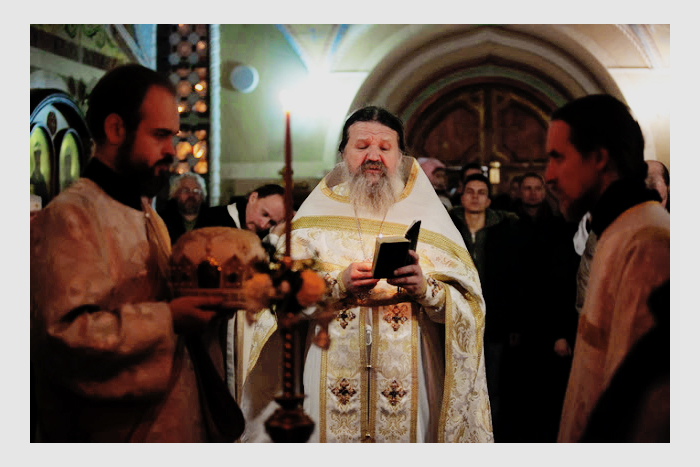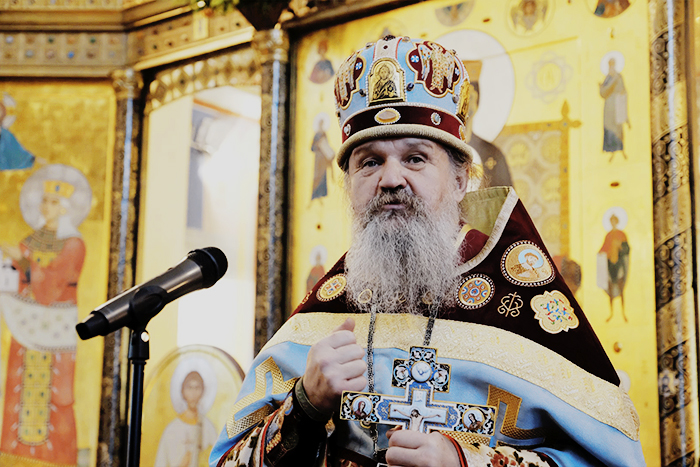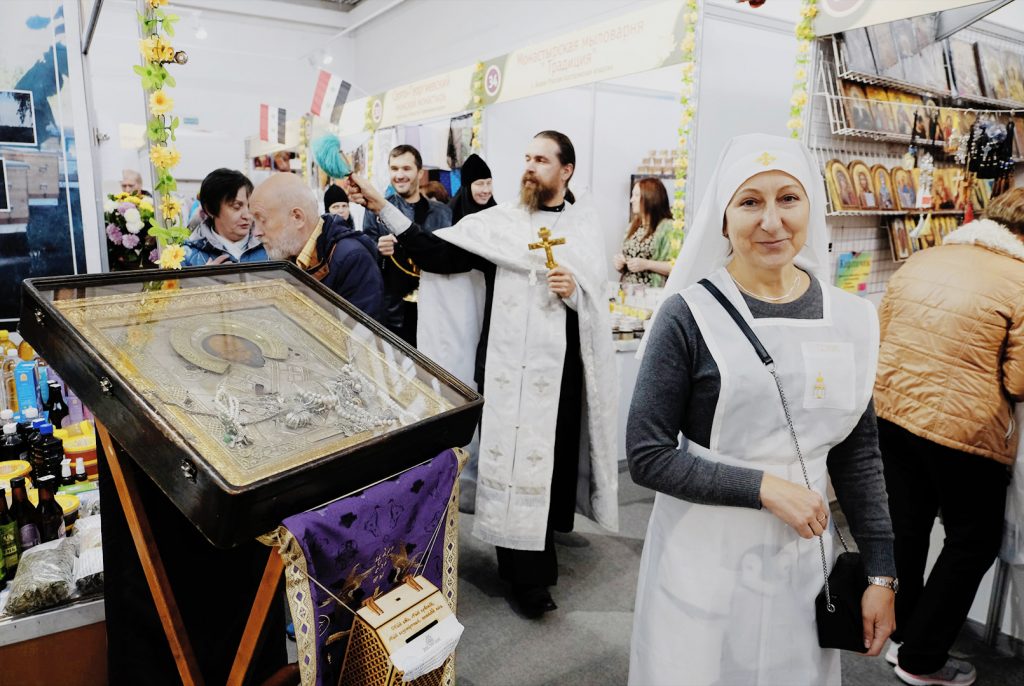
Archpriest Demetrius: New martyrs were the people who kept telling the truth in this abode of sorrows. They told the truth about Christ, about man and his calling, using not only words, but also their personal lives. Metropolitan Anthony of Sourozh used to say that one can tell the truth from two positions: either the position of power or the position of absolute weakness, total impotence. The Church must be totally powerless like God, because God does not force anyone, he does not coerce anyone: God is love and he always reaches out to us and calls to our conscience, our hearts, and our minds.
Sermon after a Liturgy on the Synaxis of the New Martyrs and Confessors of
Russian Church (February 7, 2016)
Russian Church (February 7, 2016)
______________________________________________________________________
Priest Sergius: Today we commemorate one of the greatest pillars of the Church — Saint Gregory the Theologian. The life of this man is comforting to us in many ways because, although he was a great theologian, he used to have certain shortcomings like everyone else. When he was assigned bishop to a semi-rural town where he could not possibly earn any interest, so to say, he simply ran away. Many people condemned him of this later.
As we learn about such flaws in the saint’s biographies, we should understand that holiness is not a mountain top that no one can climb, where a person is more than a human being. Holiness is when God starts to act through a sinful and weak person. It is when God acts in that person in spite of his human talents or weaknesses. Then this is not a human achievement but rather God’s grace.
Sermon after a Liturgy on February 8, 2016
______________________________________________________________________
Archpriest Sergius: We all are confessors but this is not because we go to confession. We are confessors because the Lord has given us a chance to profess our Christian beliefs in real life: not just watch a church service on your home TV or come to church twice a year to light a candle but come to church every week and testify before God what total failures we are as Christians. What we ought to do is not to count our sins during a confession but to confess that we do not know how to love Christ and we are not yet ready for open persecutions.
Time flies quickly, so we should learn to become confessors during each service, as if we are to suffer for our faith tomorrow and we need to get ready. First of all we must be confessors of the love of Christ…
Sermon after the All-Night Vigil on February 6, 2016
______________________________________________________________________

Our Church is unified, one and apostolic, and this is where her strength lies. Save for this, the hell’s gates would have prevailed over it long ago. Today we read in the biography of the Three Holy Hierarchs how these saints introduced this catholic spirit because divisions based on who is better, higher, cleverer or more spiritually advanced cannot be tolerated in the Church of Christ. We must be aware that we all serve one God.
Sermon after a Liturgy on February 12, 2016
______________________________________________________________________
Archpriest Andrew Lemeshonok: When Apostle Peter was told that Jesus was in his boat, he exclaimed in terror, «Depart from me; for I am a sinful man, O Lord» (Luke 5:8).
What should we do when we receive Christ? Christ is in you — and it’s an open wound! The more you live, the more painful it gets. When you see this awful, unappreciative attitude to God, any optimism or enthusiasm that you could possibly have disappears. What doubts could you have when Christ dwells in you? Is there anything that the Lord has not given you? What else does He have to do to make us alert, to make us happy in the Lord and capable of defeating all sorrows and sadness of this world? There are no sorrows, in fact, because everything is temporary and transient. This is why we should inhale the clean air of the church, the air of repentance, as often as possible. The church is the place where people must hear the truth about life, that the prince of this world will be driven away, and that we should not fear death.
We keep insisting on our own truth even in details. Shouldn’t we admit our mistakes? Oh no, we are always right, we are heroes, aren’t we? It makes me sick, this attitude, this lack of understanding why we have come to church and what for. Try correcting someone — you wouldn’t be happy that you did. What can we be talking about, what Christianity? We have to speak about the eternity.
This is crazy — establishing a monastery in this world. How can we change stubborn, selfish, and envious people? This is impossible! However, there is one way to do this, my brothers, there is a way! We read a story in the Lives of Desert Fathers that a hermit used to water a dry stick for many years every day. He worked really hard to bring water from a remote well. Finally, this dead and dry stick blossomed! See what this story hints at? With God, everything is alive, if only we want to come alive. He can make Abraham’s children out of stones. So as we turn to this God, we cannot but be saved, we cannot but encounter the Heavenly Kingdom. Of course, we will!
When an individual partakes of the Holy Mysteries, he may not be aware of anything but he opens his mouth and humbles down, praising the Lord. We hope that this drop of Jesus’ blood will feed us like that dry stick. Gradually, drop by drop, drop by drop — imagine how much blood of Christ we already have! We have already had a blood transfusion. We must be like Christ already. How can we spoil that blood with sin and passion? How do we manage to do that? It’s surprising!
Anyway, this is not the end of the story, my dear friends, and I am glad that the days are longer and longer, and the sun is shining more and more brightly. Pascha is near! Today we have to work hard and not to trust the sin that will keep persuading us that we won’t be saved. Of course, we will, but not without pain.
Sermon after an Akathist to St Elisabeth on February 7, 2016





